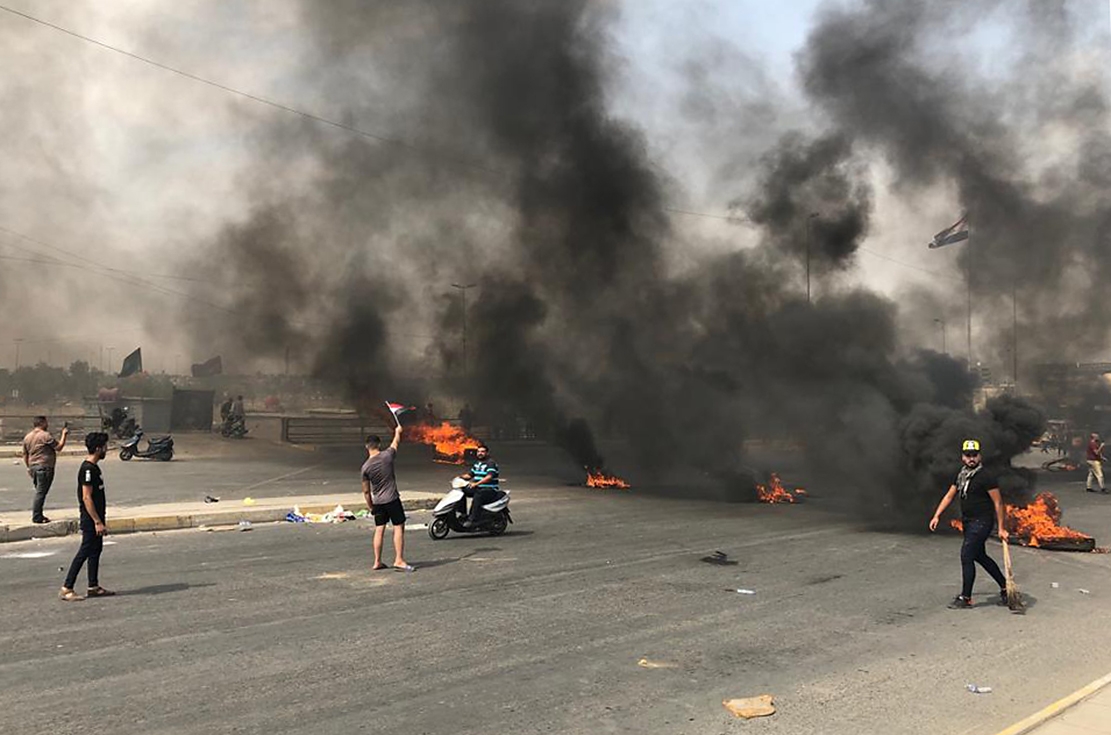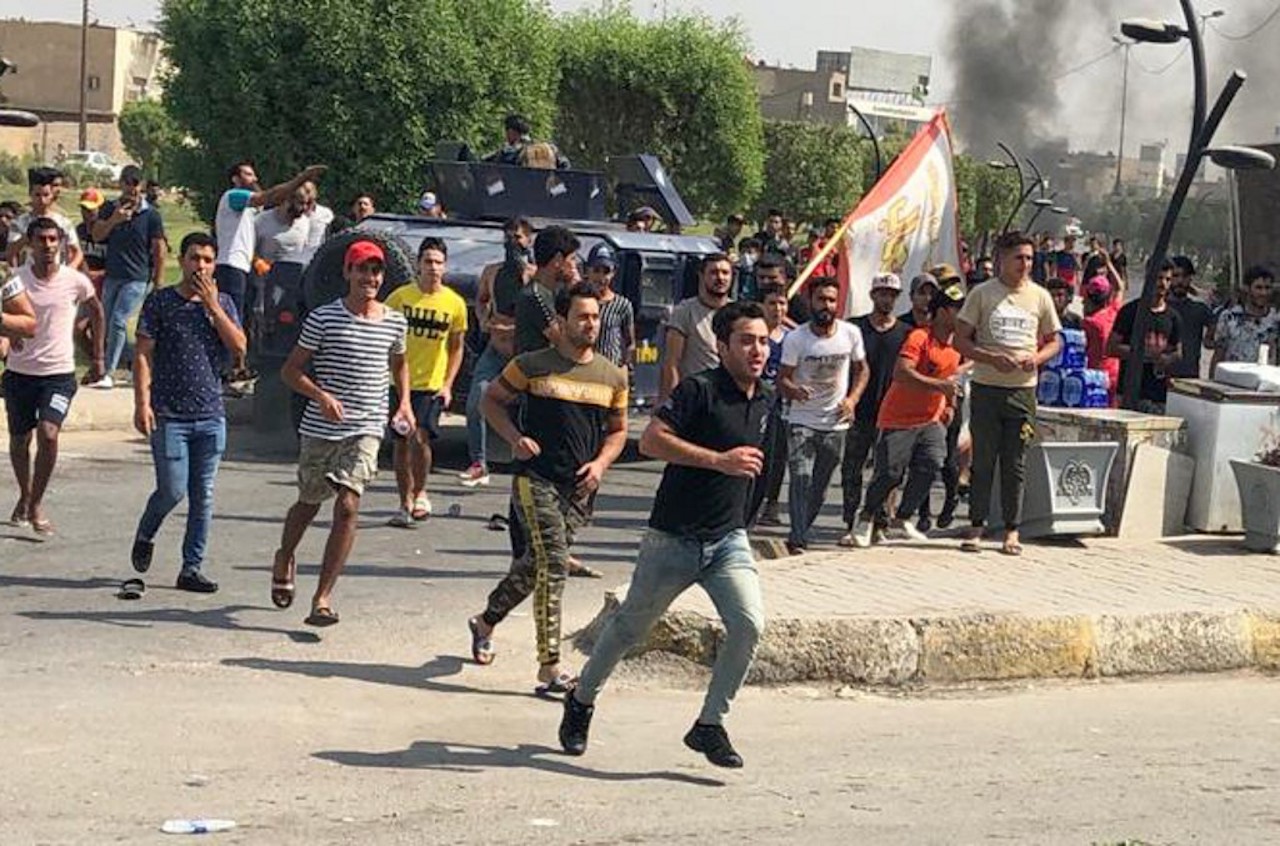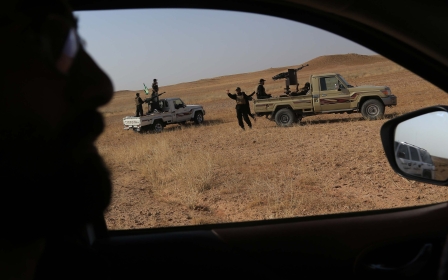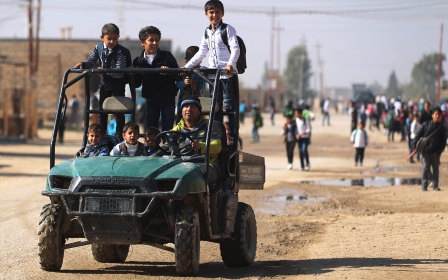Riot police open fire as second day of protest rocks Baghdad

Riot police opened fire in the Iraqi capital Baghdad on Wednesday morning as a second day of demonstrations over corruption, unemployment and other grievances began.
At least nine people have been killed, including one police officer, since Tuesday, AP and AFP news agencies reported, while another 250 people have been injured.
The violence prompted an appeal from Iraqi President Barham Salih for "restraint and respecting the law" to prevent further bloodshed.
Police opened fire on protesters on Wednesday in the al-Shaab neighbourhood of north Baghdad and in Zaafaraniya in the city's south, AFP news agency said.
The Iraqi government also moved to block access to Facebook, WhatsApp, Instagram and other social media platforms from about midday amid the upheaval.
New MEE newsletter: Jerusalem Dispatch
Sign up to get the latest insights and analysis on Israel-Palestine, alongside Turkey Unpacked and other MEE newsletters
Later on Wednesday, Iraq imposed curfews on three cities, Nassiriya, Amara and Hilla, in the country's south, Reuters reported.
The country's security forces blocked off several roads in the capital, including a bridge to the fortified Green Zone in central Baghdad, which is home to government buildings and foreign embassies, Reuters reported.
The Green Zone was reopened to the public in June for the first time since the US-led invasion of Iraq in 2003.
On Tuesday, Iraqi riot police used live ammunition and tear gas to disperse protesters who gathered around the central location of Tahrir Square.
Medics and security sources on Wednesday confirmed that a third Iraqi demonstrator died from wounds sustained when police fired tear gas and live rounds to disperse protests in Baghdad. The 55-year-old man was reportedly wounded in Tuesday's demonstration.
Protests have also broken out in other parts of Iraq.
A health official told AFP that two demonstrators were shot dead on Wednesday in the southern Iraqi city of Nasiriyah in Dhi Qar province, while five protesters and 11 members of the security forces were wounded.
Sources told Alhurra that a local government building in Dhi Qar province was burned down.
The violence shocked many who viewed the capital Baghdad, which has seen a revival of its social life since the declared defeat of the Islamic State group (IS) in March 2019, as being in a state of recovery.
A statement issued by the Iraqi interior and health ministries on Tuesday blamed “a group of rioters” for the unrest, adding that about 40 members of the security services were among the wounded.
Still, Salih said on Twitter that peaceful protest was a "constitutional right for all citizens" and said the demonstrators had legitimate grievances.
"Our sons in the security forces have the duty to protect citizens' rights and to maintain public security," he said.
"Iraq's youth are looking towards reform and job opportunities, our duty is to meet these legitimate aspirations."
The United Nations issued a call for calm on Wednesday and expressed "deep concern" over the violence that had taken place during the protests.
"The special representative of the United Nations secretary-general for Iraq, Jeanine Hennis-Plasschaert, expresses grave concern over the violence that accompanied some of the demonstrations in Baghdad and other governorates," it said a statement.
"She calls for calm and deeply regrets the casualties among both the protesters and security forces."
Corruption and unemployment
According to official figures, since 2004 almost $450bn of public funds have vanished into the pockets of politicians and businessmen.
Iraq is currently ranked as the world's 12th most corrupt country according to Transparency International's Corruption Perceptions Index.
In addition, youth unemployment in Iraq is running at around 25 percent, according to the World Bank, in a country where the vast majority of the population is under 30.
"The government is fucking stupid. We are not given any rights," Oussama Walid, a protester from the al-Washash neighbourhood, told Middle East Eye on Tuesday.
"[The media] must explain what’s going on here to the world to have a change. Try to explain, help us, help the people."
Abd al-Salam Shaker, missing one leg and sitting in a wheelchair in the heart of the protests, said the government was made up of "a bunch of thieves".
Although the problems facing Iraqis have existed for years, this week's protests - which also took place in northern and southern Iraq - appear to have been sparked by the decision to remove Lt Gen Abdulwahab al-Saadi from his role as head of the elite Counter-Terrorism Service (CTS).
Saadi is widely popular in Iraq for heading the CTS, which was at the forefront of the fight against IS.
Seen as a non-corrupt and non-sectarian Iraqi nationalist, Saadi - a Shia - commanded support from across Iraq's ethnic and religious groups.
One protester, who did not want to be identified, said he was just waiting for Saadi to come and "lead the protests".
"Our aim is to push for a powerful leader. I myself believe that he can lead us. I’m sure that he’s interested to come forward, but he needs the people to show they are behind him," he said.
Salam al-Massudi, another protester, went further.
"We want Saadi to be appointed prime minister of the government," he said.
Middle East Eye delivers independent and unrivalled coverage and analysis of the Middle East, North Africa and beyond. To learn more about republishing this content and the associated fees, please fill out this form. More about MEE can be found here.





